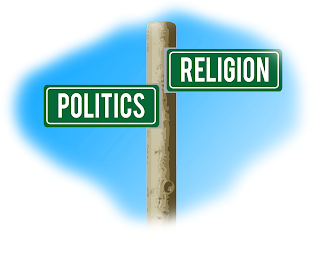Something the right and the left BOTH had better learn about religion and politics
When I heard the quote- out of context- even I was outraged. Here's the quote: "You cannot serve both God and the military." I have no trouble with Christian pacifism, although I disagree with it. But for me, anti-militarism in a potential U.S. senator is a deal-breaker.
What I didn't know- and the outraged opponents of Rev. Warnock didn't bother to mention- was the context of that statement. The military was only one of a number of things which the Rev. Warnock listed as being, though not evil in themselves, potential idols if our priorities are wrong and they become more important to us than the Kingdom of God. He wasn't attacking the military as somehow evil, but merely making a point Jesus Himself made more than once, and which frankly one even the most conservative pastors make from the pulpit quite rather regularly: you have to keep your priorities straight. As Luther said, whatever one fears, loves, and trusts in the most is really that person's god.
As a clergy type with a particular interest in church history, I am aware that (contrary to what some at my ELCA seminary seemed to think) there has never been a pacifist consensus in the Christian Church. Pacifism seems always to have been a minority viewpoint. The New Testament reports many incidents in which Jesus, John the Baptist, and various apostles encountered Roman soldiers, and never once did any of them criticize the military profession or suggest that a soldier find a different line of work.
The early history of the Church is filled with tales of the military martyrs, serving Roman soldiers who ran afoul of their superiors for refusing to sacrifice to the Emperor. In fact, one of the factors in the Roman populace turning against the persecution of Christians was the story of the so-called "Thundering Legion." A group of Roman soldiers were cut off by superior enemy forces in the desert and were dying of thirst. The Christians among them prayed for deliverance, and according to the story were answered by a rare and unseasonable thunderstorm. The Romans caught the falling rain in their helmets, drank, and were saved.
But pacifism does have a long and honorable history among Christians. As I said, I don't agree with it, but Christians I have known do; I even dated a Mennonite woman for several years. If Rev. Warnock was a pacifist- and apparently, from his subsequent remarks about the sermon, he is not- my only question would be the impact it might have on his performance of his duties in the Senate. That is a legitimate question. But the question should be asked before the answer is assumed.
But this incident involves is a matter upon which conservative Christians are a bit touchy, and not without cause. There is a perception among many conservative Christians that "progressives" in general and Democrats, in particular, are hostile to religion and especially to traditional Christianity. David French's column today pointed out that Sen. Diane Feinstein's much-publicized and very ill-advised crack to Amy Coney Barrett when the later was being considered for her last judicial appointment that "the dogma lives strongly in you, and that concerns me" not only fed that concern but helped to make Justice Barrett's eventual nomination to the Supreme Court inevitable.
My own concerns about Raphael Warnock's religious beliefs extend only to how they would affect the performance of his duties. That's the only aspect of anyone's religious beliefs that should ever matter in considering their fitness for a position of public trust. Beyond that, a person's religious beliefs are none of our business. It's not for nothing that the Constitution explicitly forbids a religious test for public office. The church one goes to- or doesn't go to- is no more relevant to their fitness for office than the color of their skin or their sexual orientation. And only when those beliefs would prevent that person from justly and competently performing the duties of an office should they ever be an issue.
There is nothing wrong with asking the question. But it is not only un-American but actually unconstitutional to assume an answer to that question and to consider it disqualifying. David French is himself a constitutional lawyer as well as a journalist. And he put it perfectly in this morning's column:
Here’s what’s unfair: disqualifying a Christian judge because he or she believes that sex is reserved for marriage between a man and a woman.
Here’s what’s fair: disqualifying a Christian judge if he or she declares they would not uphold or apply constitutional statutes or regulations protecting LGBT Americans from workplace discrimination.



Comments